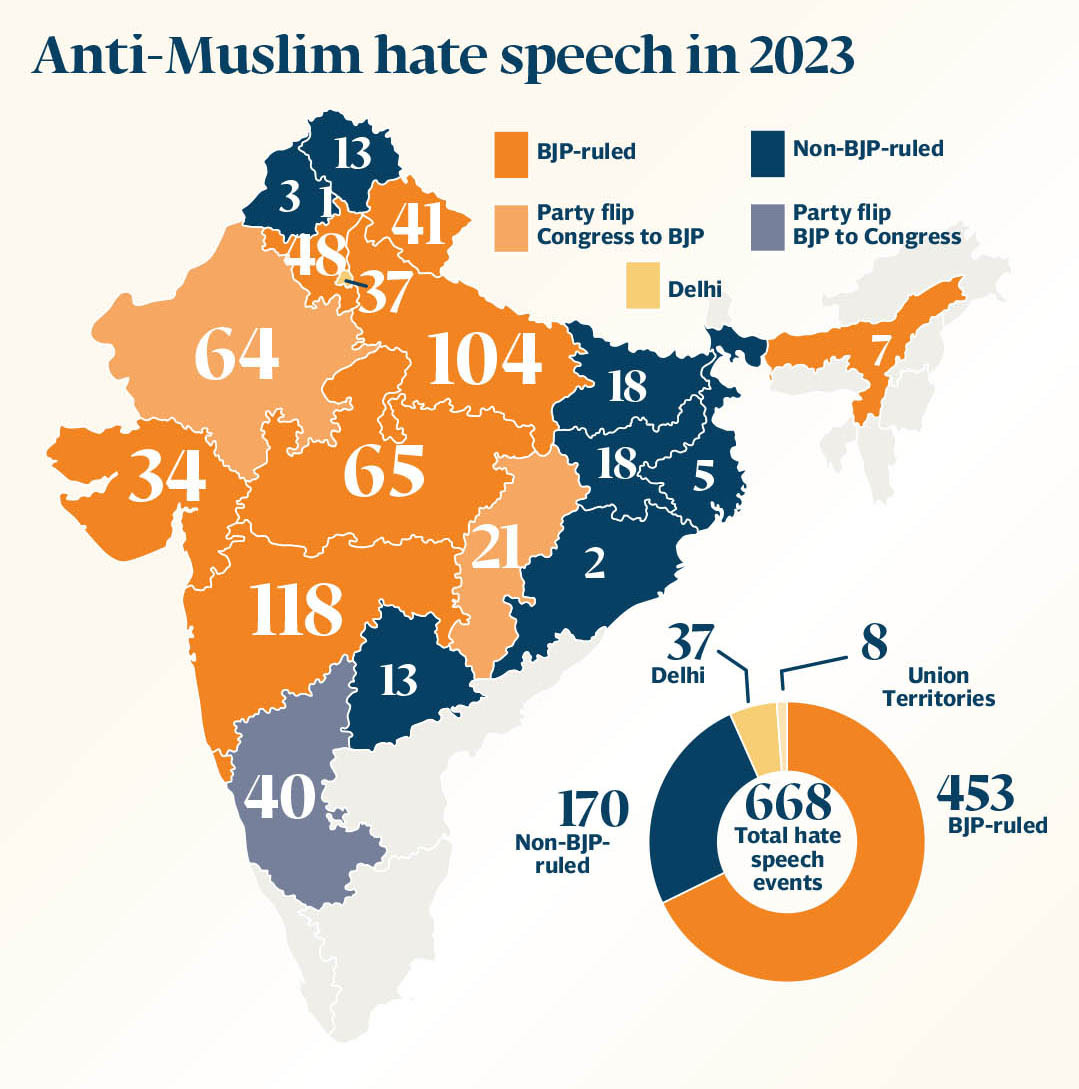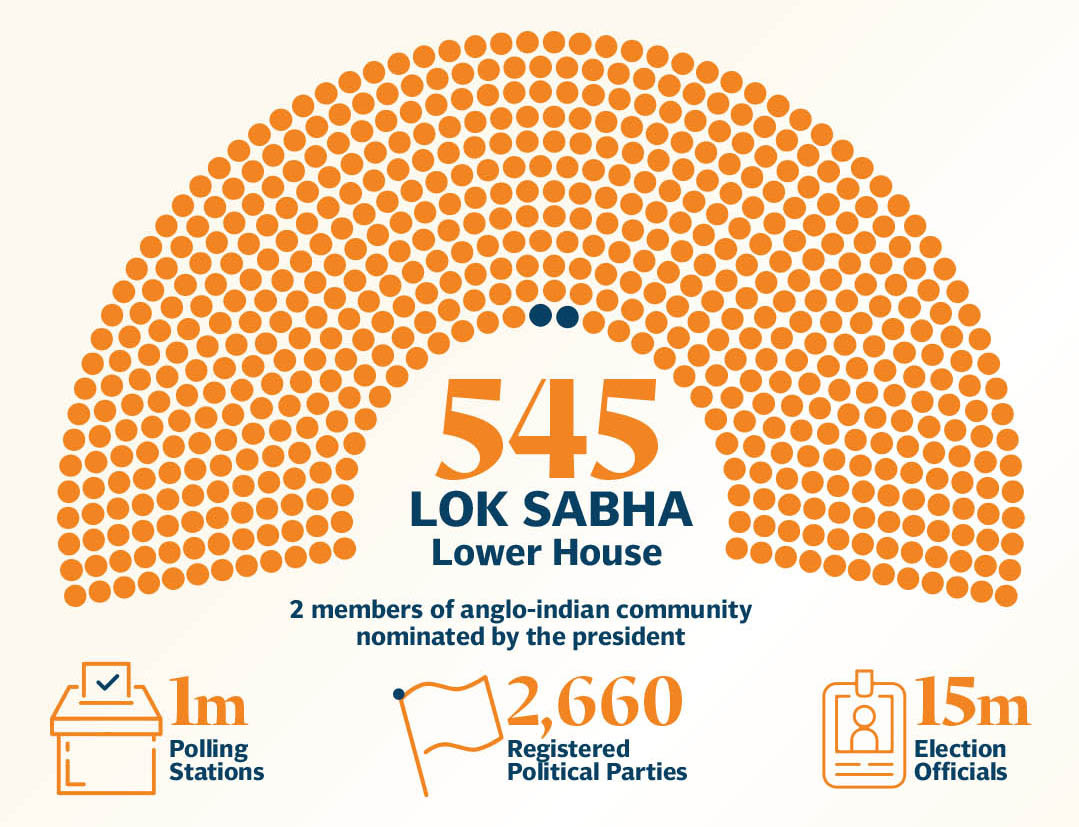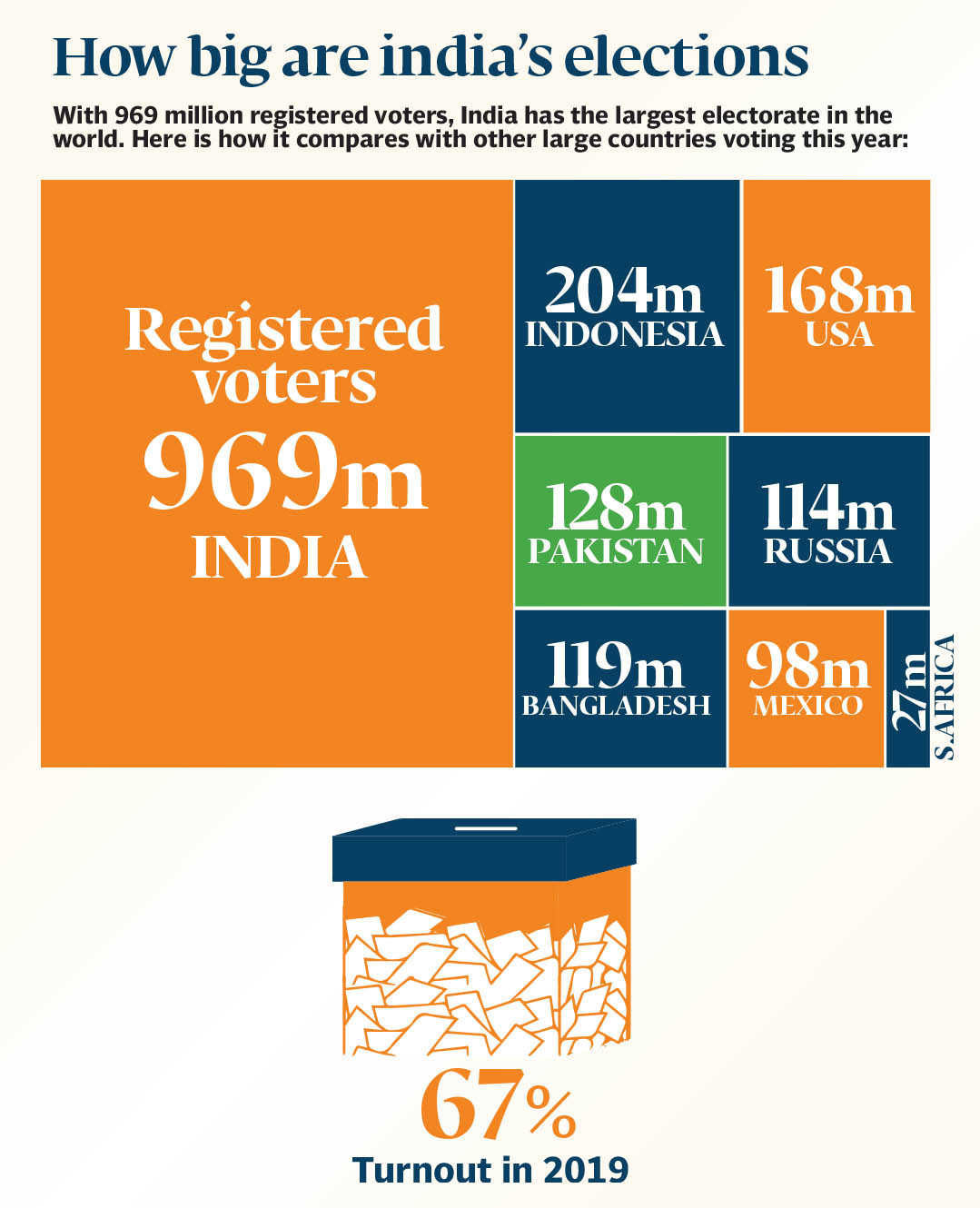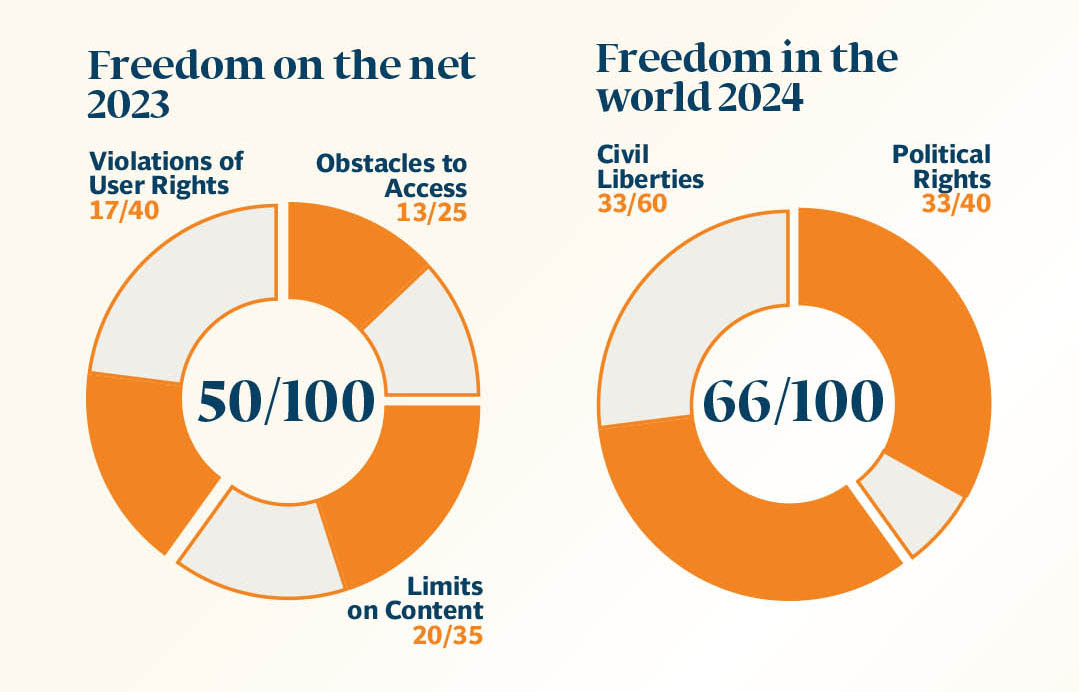Nearly one billion people are currently exercising their right to vote in India, marking what experts describe as the largest electoral event globally. Taking center stage in this consequential exercise is the candidacy of Narendra Modi, the 14th Prime Minister, who has become the global salesman of right-wing Hindu nationalism. However, this ballot represents more than a mere selection of leadership. It serves as a critical juncture in determining the trajectory of India’s democracy, its future as a secular republic, and its national narrative. Simultaneously, it holds the fate of the 200-million-strong, yet increasingly marginalised Muslim minority community in the balance.
Since assuming office in 2014, Modi has taken aggressive measures to transform India into a Hindu state. This ambitious agenda has become a cornerstone of his leadership and politics, resonating strongly with his right-wing religious base at home and abroad. Now, as Modi and his Bharatiya Janata Party (BJP) angle for a rare third term, they spare no effort in galvanising majoritarian sentiments, a tactic experts suggest may well propel them to victory at the end of the marathon elections that run until June 1.
But this defining moment for Modi, India’s populist leader, has been decades in the making. His first exposure to the Rashtriya Swayamsevak Sangh (RSS), the ideological fountainhead of the ruling BJP, was through shakhas — local units — that induct young boys for religious education. Shortly after joining, Modi, 21, became a full-time pracharak or campaigner, going around neighborhoods to raise support and funds for RSS, a group that is responsible for uncorking many extremist beliefs, and above all, admiration for Nathuram Godse, the infamous assassin of Mohandas Gandhi, father of Indian independence.
Fast forward to the western state of Gujarat, the adopted hometown of Gandhi. Here, Modi, the son of a provincial tea seller, was elevated to prominence as chief minister. During his tenure, charged Hindu mobs perpetrated acts of unspeakable savagery against Muslims in 2002. Children were forced to witness as their mothers were attacked with swords. In broad daylight, young Muslim women were stripped, raped, doused in kerosene, and set ablaze.

In one of the most harrowing incidents of the communal riots, a pregnant woman’s belly was slit open, her fetus raised on the tip of a sword, and then tossed into one of the many fires that blazed across the city. The violence, as reported by The New York Times, raged for weeks, claiming 1,000 lives, most of them Muslims, and displacing 150,000 others. Throughout this crisis, Modi, whose spiritual and political upbringing in the RSS was the driving force behind the Hindu-Muslim riots, remained conspicuously silent. Police statistics from that year revealed that the state of Gujarat, then the only major one in India governed solely by Modi’s BJP, failed to take steps to stop the horrific momentum of bloodshed.
According to a media report, police officials and survivors pinned the blame on workers and officials of Modi’s party, accusing them of instigating the Hindu mobs. That was Modi’s first state-sponsored pogrom against Muslims and Gujarat served as a laboratory for Hindu nationalism in Modi’s future politics. His silence provided tacit backing as Hindu extremist groups continued to target minority groups during his term in office.
In 2014, members of his political party, the BJP, formally endorsed him as India’s prime minister. Since then, Modi, who once hoped to become a monk, and then rose through the ranks of RSS, has scored significant electoral victories, including 2014 and 2019, dwarfing other parties and all political opponents.
The BJP’s rise to prominence is frequently attributed to Modi, who, according to analysts, has cultivated a near-cult-like following in Indian politics. Simultaneously, his decade-long tenure at the forefront of Indian governance and politics has reshaped the fabric of the constitutionally secular state, transforming it into one where Hindu mobs brazenly target minorities — particularly Muslims — ranging from hate speech to lynching. India’s democratic institutions, as reported by Freedom House, a nonprofit organisation dedicated to promoting democracy, are showing signs of strain as the press, political adversaries, and judicial bodies encounter escalating threats. Meanwhile, Modi, following his political playbook, has progressively blurred the boundaries between religion and state. This trend was particularly evident at the recent inauguration of the Ram Mandir where he presided over the consecration ceremony, performing religious rites usually reserved for priests. Such actions have elevated Modi to a divine status in Indian politics as well as the conservative religious circles. In an article published by the Washington Post following the temple's inauguration, Modi's biographer, Nilanjan Mukhopadhyay, described him as the 'chief priest of Hinduism'. At the controversial temple’s opening, marking the culmination of a years-long campaign, the BJP leader, who is also seen as the chief ‘mascot for Hindu nationalism’, declared the event as the dawn of a new era before a crowd of thousands. Decades ago, as a young RSS activist, Modi contributed to fundraising efforts for the Ram Mandir – now, as Prime Minister, he seeks a third term to advance that agenda to the next stage. Many experts view the opening of the partially completed temple as a symbolic victory for Modi’s base and his Hindu supporters, particularly the RSS, which has seen its ranks swell to 73,000 workers today, up from 45,000 in 2014 when Modi was first elected as premier.

More than a dog whistle
On the campaign trail, Modi and his fellow BJP leaders have adopted a clear anti-Muslim strategy that aligns perfectly with the Hindu nationalist ideology called Hindutva. Just last week, in a fiery campaign speech delivered in Rajasthan, the prime minister referred to Muslims by name as ‘infiltrators’ with ‘more children’ who would acquire all of India’s wealth if his opponents from the Indian National Congress, a party led by Jawaharlal Nehru’s grandson, took power.
“The brazenness makes it evident that Modi has amassed significant power domestically, and his predominantly Hindu nationalist base approves of his tactics against Muslims. Watchdog institutions at home in India appear to have largely succumbed to the will of his BJP, while the West appears to have turned a blind eye to the ongoing regression in India,” cautioned Dr. Talat Wizarat, former Professor of International Relations at the University of Karachi.
This is not the first instance of Narendra Modi or his BJP leaders attempting to stoke communal tensions. According to a recent report by the Council on Foreign Relations, a leading US-based think tank, Muslim communities in India have long endured discrimination, a situation that has been exacerbated under the Hindu nationalist BJP government, which has pursued such an agenda since coming to power in 2014.
Since Modi’s reelection in 2019, the government has advanced contentious policies criticised for explicitly disregarding Muslims' rights, curbing religious freedoms, and aiming to disenfranchise nearly two hundred million Muslims in India. Violence against Muslims has become more prevalent under the BJP administration, sparking protests domestically and drawing muted international condemnation, particularly after he launched the controversial citizenship act, aimed at depriving Indian Muslims. Some experts monitoring India suggest that Modi’s reelection in 2024 would likely deepen religious divisions in the country.
“India’s Muslims are already paying a price under the Modi regime. In his third term, Muslims and Christians will be downgraded to a level below second class citizens,” warned Dr. Ashok Swain of Uppsala University.
With BJP’s victory in the 2024 election appearing increasingly likely, concerns are mounting within already marginalised Muslim communities across India. “The Indian Prime Minister’s appeal as a political figure, coupled with the BJP’s Hindu nationalist agenda, deeply resonates with the vast Hindu majority of the country, particularly in the densely populated Hindi belt of the north. His reelection will likely exacerbate the widespread persecution of Muslims,” cautioned Wizarat.
While the word ‘secular’ was added to the preamble in 1976, the Indian Constitution does not explicitly mandate the separation of religion and government. According to Swain, the BJP aims to ‘undo’ this during a potential third term. “On paper, India may appear as a secular state, but Modi intends to reverse this and may even seek to amend the Indian Constitution to realise his vision of a Hindu Rashtra, or Hindu state,” said Swain.
Modi is not alone in advancing an anti-Muslim agenda within the BJP. Yogi Adityanath, a fiery Hindu cleric, currently governs Uttar Pradesh, India's most populous state. Adityanath has publicly advocated for India to be declared as a Hindu rashtra, or Hindu nation, and has backed the construction of a temple dedicated to the Hindu deity Ram at the location of a demolished 16th-century mosque, a project that triggered violent religious clashes in the 1990s. For Narendra Modi, the appointment of the hardline Hindu chief minister, who is also his probable successor, marks a clear departure from Nehruvian policies, which had afforded minorities a somewhat elevated status.
When asked to comment on the Hindutva agenda during Modi’s decade-long term as India’s Prime Minister, Swain cautioned that it has been openly employed over the last five years, if not a decade. “We can expect it to reach new heights during his third term.”
In reference to Modi’s speech in Rajasthan, Wizarat said: “This kind of hate speech will only embolden hardline Hindu right across India to do whatever they want against Muslims and other minorities – this is more than a clear dog whistle by the BJP leader.”
Under Modi’s leadership, India has witnessed a surge in hate crimes, particularly directed at Muslims. BJP-supported hate speech and disinformation have spread extensively online, with several high-ranking party officials openly advocating violence against Muslims. According to Hindutva Watch, a Washington-based organisation monitoring attacks on minorities in India, there were 255 documented instances of hate speech gatherings targeting Muslims in the first half of 2023.
The group’s report, released last year, indicates that approximately 70% of these incidents occurred in states slated to hold elections in 2023 and 2024.

State of autocracy
Under the BJP nationalist administration, India, often hailed as the ‘world's largest democracy,’ has faced mounting criticism from numerous rights groups for significant democratic regression. A report published by The Guardian revealed that senior Indian officials held multiple meetings to address concerns over the country’s consistent decline in the global Democracy Index, compiled by the Economist Intelligence Unit, under Modi’s leadership, reaching a nadir four years ago. India was categorised as a ‘flawed democracy’ by the UK-based private company, which publishes the weekly newspaper, The Economist. Additional assessments have raised alarms as well. In 2021, the US-based non-profit Freedom House downgraded India’s democratic status from ‘free’ to ‘partially free’. Meanwhile, the V-Dem Institute in Sweden labeled India as an ‘electoral autocracy.’
According to Dr. Ashok Swain, Professor of Peace and Conflict Studies at Uppsala University in Sweden and a vocal critic of the Modi administration, India’s democratic fabric has experienced a significant deterioration during the BJP’s tenure over the past decade.
“India is no longer a democracy. Under Modi, the country has devolved into an autocracy,” added the Sweden-based academic.

Sponsoring extremism
Modi, a lifelong supporter of the RSS, the parent organisation of the Hindu nationalist Bharatiya Janata Party, has endorsed extremism both domestically and internationally. Despite India’s projection of a ‘clean’ image, a complex network of transactions, camouflaged as charitable endeavors, intertwined with a web of extremist organisations operating domestically and abroad, as well as the clandestine funneling of financial support to Hindu supremacist and religious groups, collectively cast a dark shadow over India’s purported stance against terrorism in the eyes of the global audience it has been trying to charm for decades. These funds have been used by RSS and its affiliates to target India’s minorities, particularly Muslims and to advance the Hindutva agenda globally.
More recently, India faced accusations from Prime Minister Justin Trudeau. The Indian government was called out for its involvement in the killing of a Canadian Sikh activist near Vancouver. In 2023, just a few months apart, Washington also issued a similar warning to New Delhi. The revelation of an alleged plot to assassinate a prominent Sikh separatist on American soil exposed the Modi government’s clandestine activities abroad and created a potential obstacle to the deepening ties between the two countries.
This year, around the time India went to the polls, the Modi government sought to publicise that it had conducted the assassination of over 20 purported terrorists on Pakistani soil. According to experts, the Modi government has drawn inspiration from the Israeli playbook. However, they cautioned that it might not receive the same level of leniency from the West for an indefinite period. “India’s apparent belief that it can replicate Israel’s strategy and avoid repercussions may be misplaced. Unlike Israel, India cannot count on the same degree of support from the US,” remarked Swain. On the other hand, Wizarat bluntly described India’s activities as state-sponsored terrorism that violates the sovereignty of other nations.
Commenting on India’s tactics, Michael Kugelman, Director of the South Asia Institute at the Wilson Center, a Washington-based think tank, remarked: “Such actions contravene fundamental principles of international law, including territorial integrity and national sovereignty, and are evidently unlawful. Furthermore, if these actions backfire, innocent civilians could suffer. However, it's important to acknowledge: Moral considerations typically do not guide international relations.” “So much is strategic and interests-based. And that helps explain why India will likely enjoy impunity,” he added.
Kugelman further added that India knows that this leniency is unlikely to change, and the free passes will continue—at least so long as India continues to enjoy the global status of a critical strategic actor and market. “I don’t see that status changing anytime soon,” the Washington-based expert added.
Wizarat elevated the concern by asserting that if India’s actions remain unchecked, they will empower other nations to pursue similar activities, which she contends unequivocally, qualify as terrorism.

Open-air prison
In 2019, the BJP government unilaterally revoked the autonomy of the occupied Kashmir region. Government officials cut off Internet, mobile, and even landline connections, plunging the valley into an information blackout.
For years, India’s Hindu nationalists have sought to restrict the special freedoms afforded to Occupied Kashmir, a predominantly Muslim territory that has been a volatile flashpoint between India and Pakistan, both nuclear-armed nations.
“The occupation of Kashmir and the manner in which its rights were stripped away in 2019 serve as a stark indication of what Modi might pursue in his third term,” remarked Wizarat. “India has oppressed Kashmir’s Muslims and confined them to a vast open-air prison for decades. The world remains largely unaware of the situation unfolding within,” added the Karachi-based foreign policy expert. “This is not in line with any democratic principles,” she emphasised.
Last year, Amnesty International, a London-based human rights organisation, which has been targeted by the Modi government for its condemnation of oppressive tactics in Indian-occupied Kashmir, disclosed that civilians in the valley, under Indian control, have endured egregious violations of their rights to physical and mental well being, including arbitrary detention and extrajudicial killings. According to the group, the situation has deteriorated following the revocation of Article 370 in 2019, which stripped the occupied territory of its rights.
Karachi-based expert, Wizarat, warned that during his third term, Modi might even orchestrate a full-fledged genocide in the occupied territory, all while the world remains unaware of the atrocities that are being carried out by the Indian forces.
